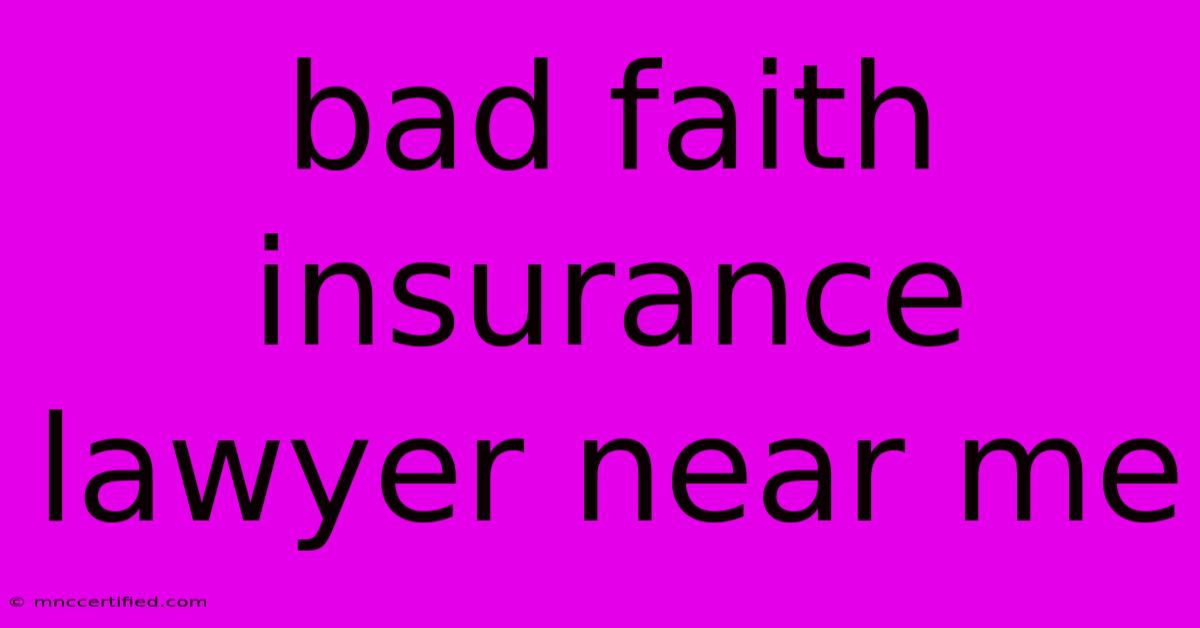Bad Faith Insurance Lawyer Near Me

Table of Contents
Finding a Reputable Insurance Lawyer: Navigating Bad Faith Claims Near You
Dealing with an insurance company that denies a legitimate claim or engages in unfair practices can be incredibly frustrating and stressful. This is where understanding bad faith insurance claims and finding a skilled bad faith insurance lawyer near me becomes crucial. This article will guide you through the process of identifying and choosing the right legal representation to fight for your rights.
What Constitutes Bad Faith by an Insurance Company?
Insurance companies have a contractual obligation to act in good faith and deal fairly with their policyholders. Bad faith insurance occurs when an insurer knowingly violates this duty, leading to significant harm to the policyholder. Examples include:
- Unreasonably denying a valid claim: This could involve rejecting a claim without proper investigation or using flimsy excuses to avoid paying out.
- Delaying claim processing: Unreasonably prolonging the claims process, causing unnecessary financial hardship and emotional distress.
- Failing to properly investigate a claim: Insufficient investigation or a biased investigation that favors the insurer.
- Offering an unreasonably low settlement: Attempting to settle a claim for significantly less than its actual value.
- Breaching the implied covenant of good faith and fair dealing: This overarching principle dictates that both parties in a contract must act honestly and fairly.
Identifying bad faith requires careful examination of the insurer's actions and the specifics of your policy. Documentation is key. Keep records of all communication, including emails, letters, and phone calls.
How to Find a "Bad Faith Insurance Lawyer Near Me"?
Locating a qualified bad faith insurance lawyer near me requires a strategic approach:
1. Online Search: Refining Your Search Terms
Don't just type "insurance lawyer." Be specific! Use variations like:
- "Bad faith insurance lawyer [your city/state]"
- "Insurance claim denial lawyer [your city/state]"
- "Unfair insurance practices attorney [your city/state]"
- "Insurance bad faith litigation attorney [your zip code]"
Use Google Maps to visually locate lawyers close to your area.
2. Online Directories and Legal Referral Services
Websites like Avvo, Martindale-Hubbell, and the state bar association websites often provide lawyer profiles with client reviews and ratings. Legal referral services can connect you with attorneys specializing in insurance bad faith.
3. Professional Networks and Referrals
Ask friends, family, or colleagues for recommendations. Your primary care physician or financial advisor might also have suggestions.
Choosing the Right Bad Faith Attorney: Key Considerations
Once you've compiled a list of potential lawyers, consider these factors:
- Experience: Look for attorneys with proven success in handling bad faith insurance claims. Check their track record and case results.
- Specialization: Ensure the lawyer specializes in insurance law, ideally with a focus on bad faith claims. This expertise is invaluable.
- Client Reviews and Testimonials: Online reviews can offer insights into the attorney's communication style, responsiveness, and overall client experience.
- Consultation: Most lawyers offer initial consultations, often free or at a reduced rate. This allows you to assess their expertise, communication style, and whether they're a good fit for your case.
- Fees and Payment Structure: Understand their fee structure (hourly rate, contingency fee, etc.) before proceeding. A contingency fee means they only get paid if you win the case.
Preparing for Your Consultation with a Bad Faith Insurance Lawyer
Before meeting with an attorney, gather all relevant documentation:
- Your insurance policy
- Claim denial letter(s)
- All communication with the insurance company
- Medical records (if applicable)
- Repair estimates or invoices (if applicable)
- Photos and videos (if applicable)
Being prepared ensures a productive and informative consultation.
Next Steps After Finding Your Lawyer
Once you've chosen a lawyer, work closely with them to build a strong case. They will guide you through the legal process, negotiate with the insurance company, and represent your interests in court if necessary. Remember, seeking legal counsel is crucial when dealing with bad faith insurance practices. Don't hesitate to reach out to a qualified bad faith insurance lawyer near me to protect your rights and secure the compensation you deserve.

Thank you for visiting our website wich cover about Bad Faith Insurance Lawyer Near Me. We hope the information provided has been useful to you. Feel free to contact us if you have any questions or need further assistance. See you next time and dont miss to bookmark.
Featured Posts
-
Buy Tate Mc Rae Miss Possessive Tour Tickets
Nov 16, 2024
-
Denmark Vs Spain Live Match Uefa Nations League
Nov 16, 2024
-
Insurance Brokers In Brierley Hill
Nov 16, 2024
-
Fbla Insurance And Risk Management
Nov 16, 2024
-
Denmark Vs Spain Lineups Odds Tv Guide
Nov 16, 2024